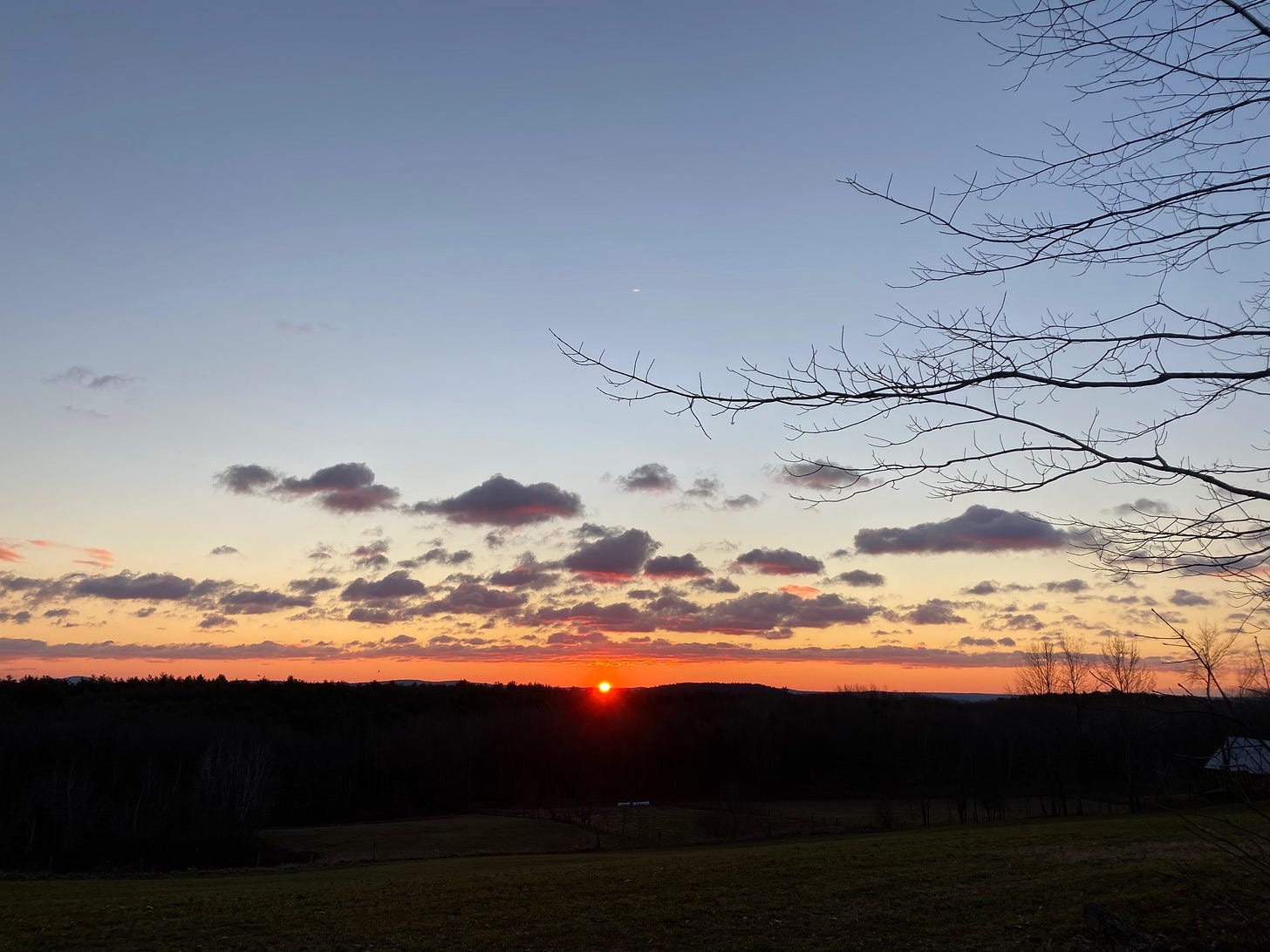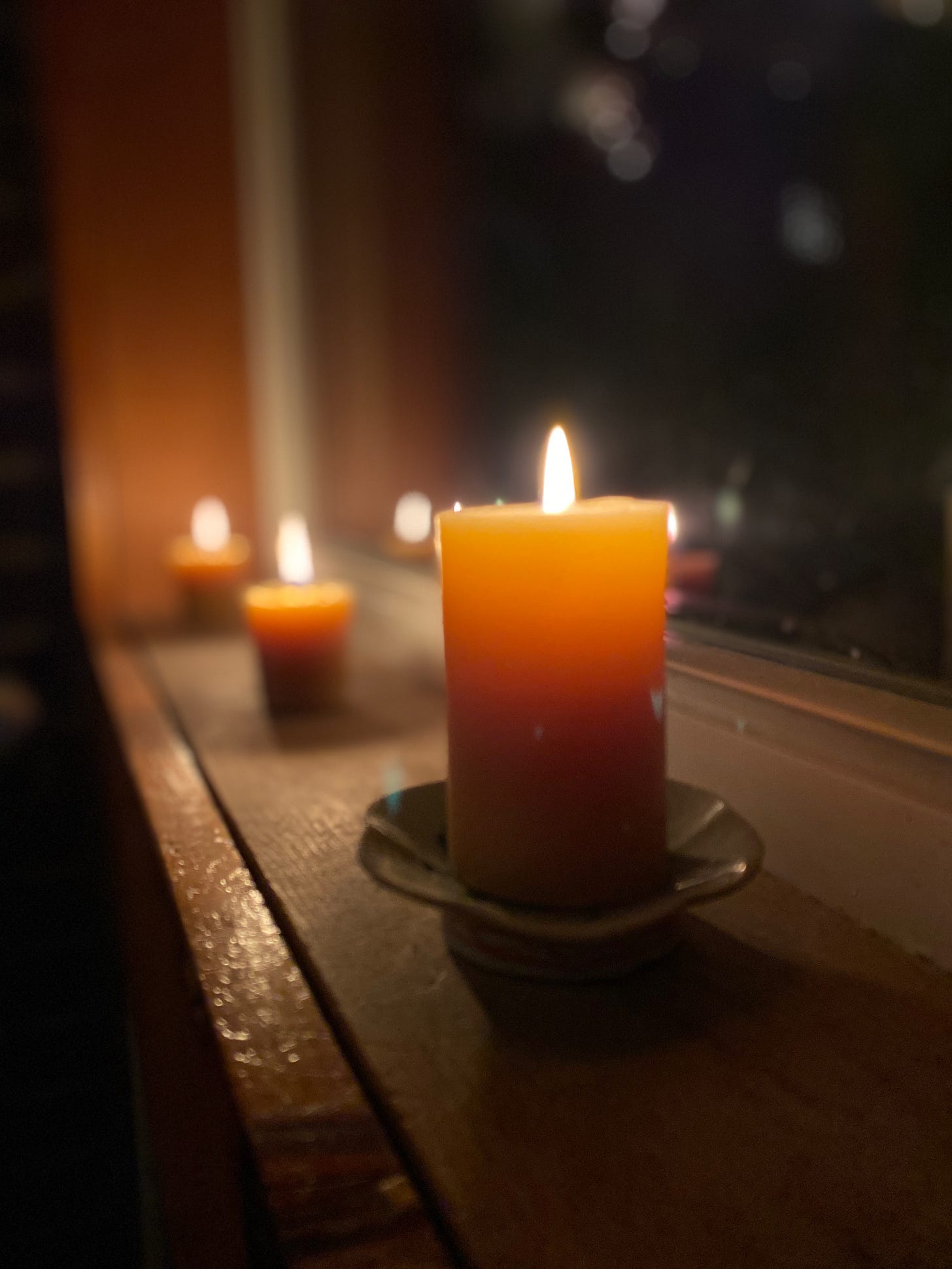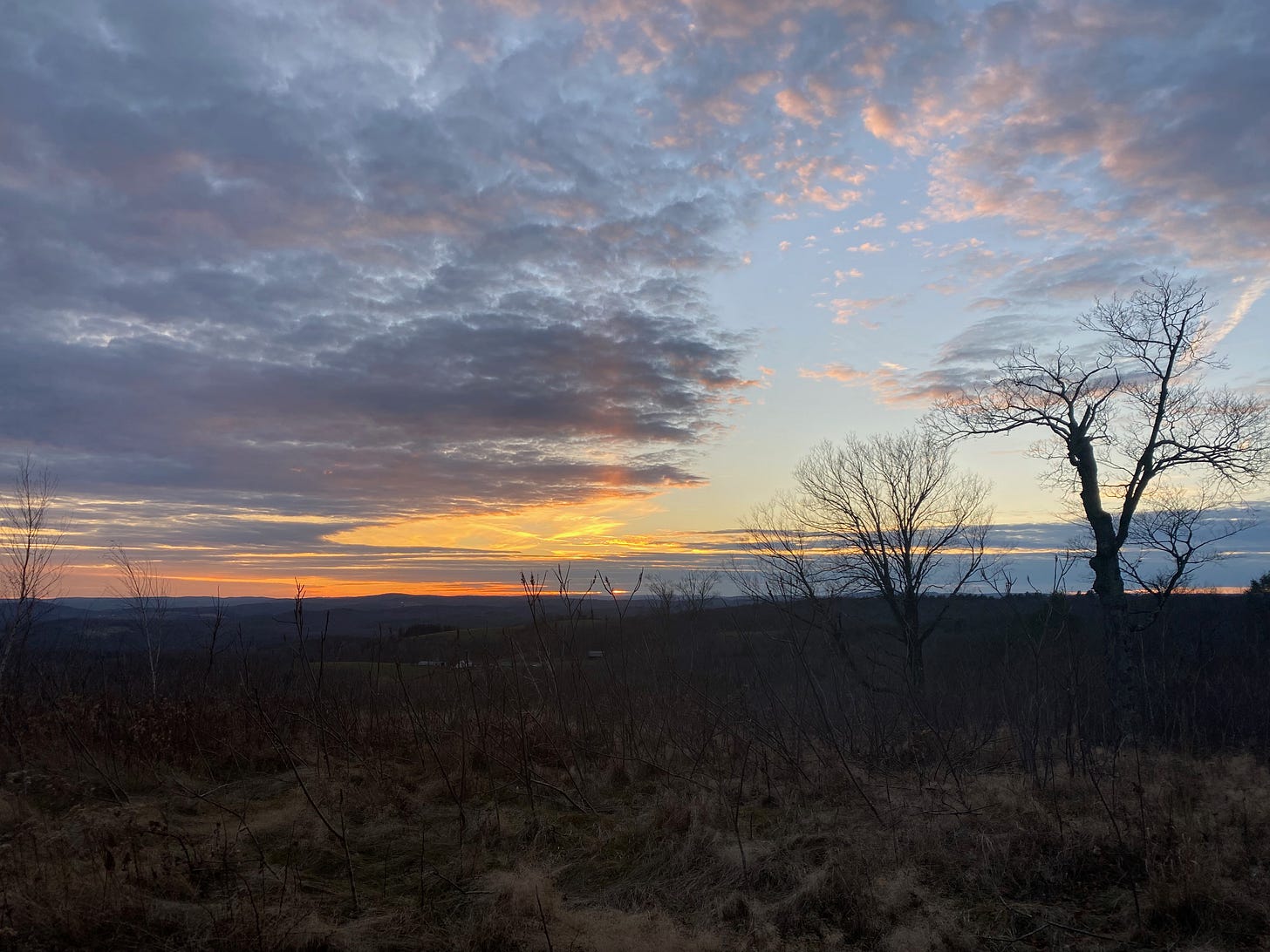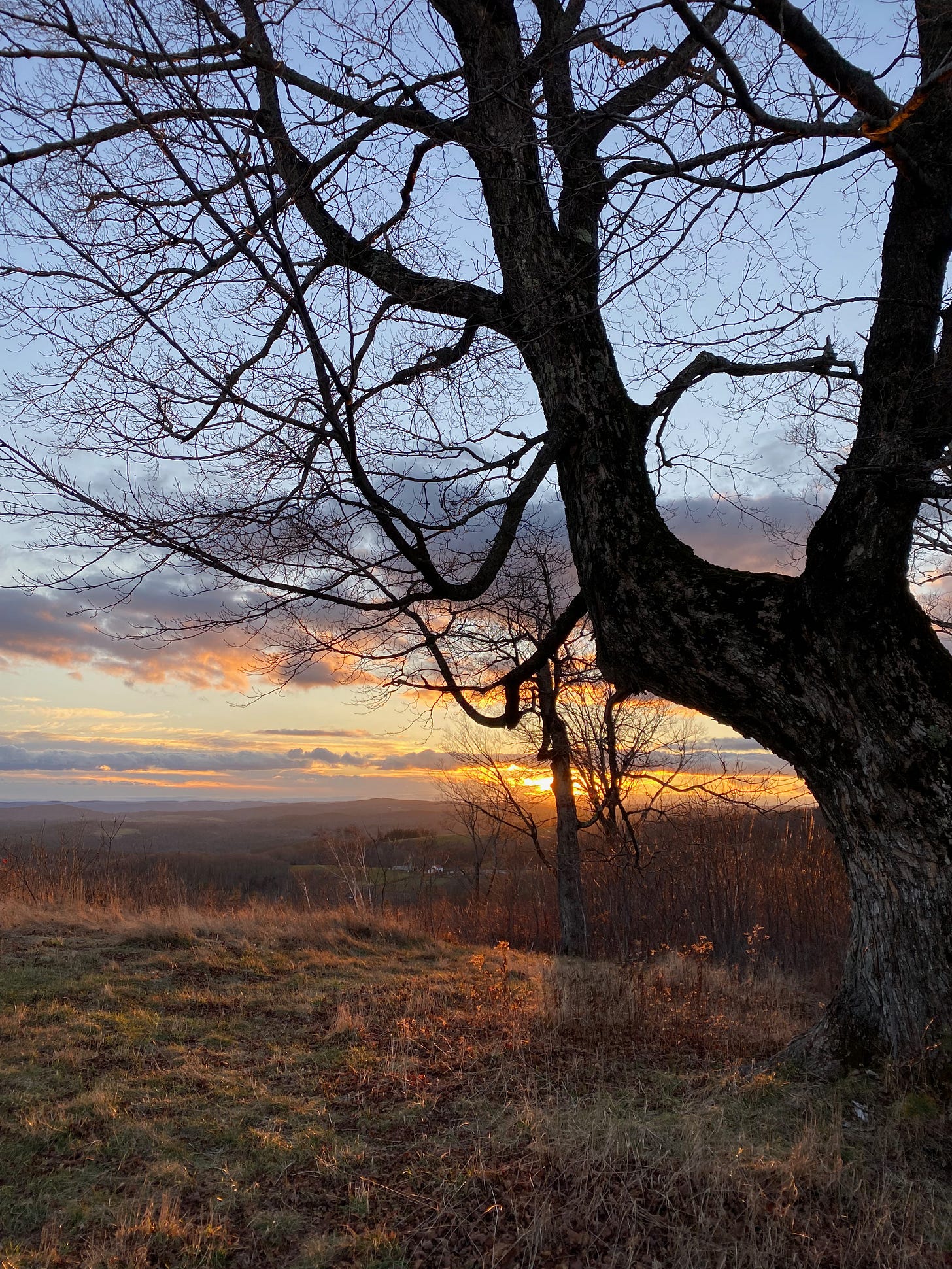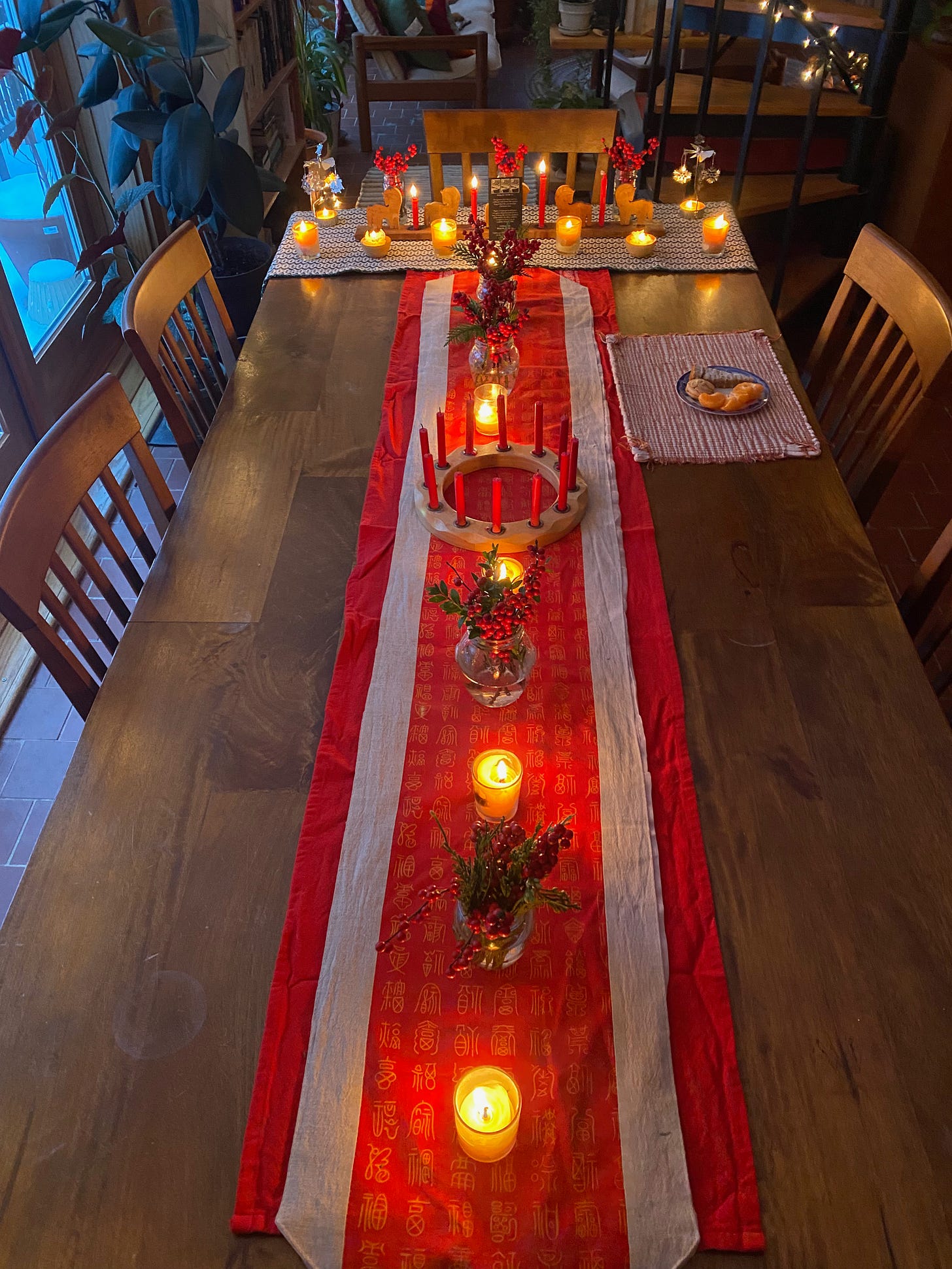Volume 2, No. 51: The Brimming Bowl in the Season of Light
On Rereading Circe as the Days Grow Dark
Greetings, book and treat people!
I love writing the newsletter, but it’s a lot of work. After almost two years, I’ve realized that reading and recommending twelve books per month is too much. I’ve also realized how much I miss having time for the kind of writing that most excites me—personal, in-depth book reviews, and essays that explore a variety of books from a particular (queer) angle.
So, starting in 2023, free subscribers will get two newsletters per month—the ones you’ve come to expect, with themed book recs, recipes, and lots of bookish tidbits. In the alternating weeks, I’ll be writing essays for paid subscribers only.
This week’s essay is an example of what you can look forward to in the new year. If you’d like to keep receiving essays like this (as well as occasional special editions) you can subscribe here. Subscriptions are $6/month (or $66/year). At the risk of sounding like Wikipedia or NPR: paid subscriptions make an enormous difference in my life. I wouldn’t be able to write this newsletter without them.
I had a lot of fun making this week’s Bookish Teatime video, It’s a peek into a few of the books at the top of my 2023 TBR—and a secret hint about a project I’ve been working on for months, which I’ll reveal in Friday’s newsletter!
Around the internet this week, I reflected on reading pandemic books, and whether it’s cathartic or anxiety-producing. And if you’re wondering what 2023 queer books to preorder, I made a quiz to help you decide!
Thank you all for reading, for talking with me about book cataloging and libraries, for being here week after week. The last special edition of 2022 will hit your inboxes on Friday. In the meantime, I’m wishing you all the brightest and best in these, the darkest days of the year, in this precious and fleeting Season of Light.
The Brimming Bowl in the Season of Light
The last line of Circe is, perhaps, my favorite sentence in all of literature. I’ve read the novel five times. Each time, as I approach the magnificent ending, I start sobbing. I know what’s coming. I have the last paragraph memorized. Yet time and time again, the words remake me. I cannot read them without stretching myself into a new shape. I have thought, often, of having that last sentence tattooed on my body, though, in recent weeks, I’ve been imagining an image instead. I can see it already: a wide bowl overflowing with ocean waves.
I do not feel this way about any other book. I have never longed to carry another person’s words on my body the way I long to carry this sentence written by Madeline Miller. I cannot explain it. Circe is a beautiful book, layered and rich and full of story. The story goes down and down and down; I am certain I will never come to the end of it. But there is some alchemy in my relationship with it, some magic or mystery I cannot parse. It is not my favorite book. It is not a book I thrust at everyone I know. It is simply the book that has lodged itself deepest inside me. It has burrowed in, and made itself a home.
I reread it a few months after finishing it for the first time, and I have reread it every year since then. I did not intend for rereading Circe to become a December ritual. It happened in the way that the truest rituals often do: through action. This rereading has stitched itself into the rhythm of my Decembers. It has become unshakable. I will reread Circe every December until I die.
At the end of the book, Circe, after a thousand thousand lifetimes, finally knows who she is and what she wants. She goes down to a shallow pool on the island of Aiaia, the island she has made her home with sweat and work and rage and tears. She carries with her the moly flowers she has harvested, the flowers she once used to transform the nymph Scylla into a monster. This transformation has haunted her for centuries. She squeezes their sap into her old bronze bowl. She makes a potion that contains all of herself, hoping it will transform her into what she has spent her life becoming: a mortal.
Miller does something extraordinary with time in these last pages. The final chapter begins in the past tense, the storytelling tense, the same tense the whole novel has unfolded in. Circe stares at the bowl of potion she has made. “I could feel the fear in myself, gleaming like water.” But as she stirs it, she imagines the life she wants, blossoming. “Perhaps all I hoped would come to pass,” she says, and then she begins to sketch out the vision: she and her lover Telemachus traveling the world, making their way together, he as a carpenter, she as a healer. We would, we would, we would, she says, the uncertain hope written into the tense of the words: future conditional. Maybe.
And then the tense shifts and hardens. “We have a daughter, and then another.” Circe imagines these future daughters with easy certainty. She is no longer using the future tense in any form. Now we’re in the simple present. She is an old woman, rising in the night from her bed, the old fears and anxieties and sorrows swirling through her. Telemachus rises to find her.
Circe, he says. It will be all right.
It is not the saying of an oracle or a prophet. They are the words you might speak to a child. I have heard him say them to our daughters, when he rocked them back to sleep from a nightmare, when he dressed their small hurts, soothed whatever stung. His skin is familiar as my own beneath my fingers. I listen to his breath, warm upon the night air, and somehow I am comforted. He does not mean that it does not hurt. He does not mean that we are not frightened. Only that: we are here. This is what it means to swim in the tide, to walk the earth and feel it touch your feet. This is what it means to be alive.
And then we’re back on Aiaia. Circe kneels in front of her bowl of potion, still a goddess, still immortal. She has yet to drink. But Miller doesn’t switch back into the past tense. The last paragraph of the novel, the sentence I want etched on my skin, remains in the present.
All my life I have been moving forward, and now I am here. I have a mortal’s voice, let me have the rest. I lift the brimming bowl to my lips and drink.
***
I can’t remember when I started referring to December as the Season of Light. Perhaps it’s an echo of Chanukah, the Festival of Lights. Certainly there are many December holidays, across many cultures, that celebrate light. But though there are certain Christmas traditions I cherish, the magic of this time for me is not rooted in any of them. I love the darkness for itself—for the gifts it brings and the space it makes.
December is the darkest time of year in the hemisphere where I live. I’ve always thought of January as the brightest month, with its lengthening days and intense, concentrated sunlight. December is not bright at all. Summer is something else entirely. It is bright, but there’s a haziness and a harshness to its brightness. It is full of light, in its way, but the light that fills summer days is passive. It requires no action. We don’t have to reach for it.
I love winter for a thousand thousand reasons, but most of all for the way it reveals the bones of things, illuminates what’s hidden.. The true shapes of trees, the textures of darkness. Winter invites and requires me to sit with darkness, and with what darkness contains—quiet, transformation, change. I celebrate the Season of Light not in defiance of darkness, but in wonder at it. I fill my house with candles not to keep the darkness out, but to invite it in.
Winter is a season of becoming, and Circe is a book about becoming. Miller writes about the essence of a thing—what it is to be a human woman—by writing about that thing becoming itself. Of course I crave this book as I cross the threshold into the Season of Light. I am always thinking about becoming this time of year.
What does it means to welcome and inhabit the dark? What does it mean to make space for it? I think of Circe, and the thousand lifetimes it takes her to understand that she is not an unchanging goddess but a human: small, fallible, mortal. I think of the potion she brews to make this knowledge visible, a potion imbued with all those long years of living.
Most trees form buds in the fall. Walking through the woods around my house, it is easy to spot the tiny, tight curls of cells, sitting dormant until spring. This, too, is what winter reveals: all the life to come in future springs. Perhaps this is what it means to welcome the darkness: to stir it into our very being, to recognize it as kin. I do not have Circe’s thousand lifetimes, but it is in the quiet of the shortening days that I find the seeds for future potions. It is in winter that I turn to my brimming bowl, begin collecting.
In December I fill my house with light. I rise in darkness and watch the sunrise. I walk on the ridge in the late afternoon and pull the early sunsets close. With the cold wind on my face, I think about Circe’s brimming bowl, and about my own.
I can’t stop thinking about Circe’s potion. She spends her life searching for cures beyond herself, for magical balms for her many griefs, for the trick, the flash, the answer that will clear the muck, cut through the haze. In the end, the only thing that works is living. Living is what makes her mortal. The potion is merely the work made manifest.
There she is, on her island, a place she has nurtured and protected and raged against and learned. There she is, with her old griefs, her open wounds, with all her mistakes, her bitter wisdom, her witchery and her work. Circe, immortal, longing for a life small enough to fit inside the lives of those she loves, puts herself into the bowl and lifts it to her lips.
The novel does not end at the end, or at the beginning. It ends in the midst of becoming. It ends with Circe in the act of drinking, the potion on her lips. I will never be done becoming, but here in the dark, as I count the days down to the solstice, I begin the ritual gathering. This is what I hold onto in the rush and mess of this broken world. This is what I make space for: the potion in process.
***
The first time I read Circe, it was summer. I can’t remember what was happening in my life then. I read it again that fall, and I have read it ever December since. I still can’t name the thing that beats inside it, matching my own heartbeat, the why of it. I’m no longer interested in trying to explain it. Circe came into my life at a moment I needed it, and, as I’ve read it over and over again, it has become a part of me. It is like a second skin, familiar and worn. December arrives, with its wind, its twinkle, its shadows. I gather evergreens and fill my house with light. The deep quiet settles inside me, and Circe calls, a part of the gathering dark, the shortening days, the blazing light.
This year, I listened to the last pages while walking along my beloved ridge at sunset. Nessa bounded ahead of me on the trail. I turned my face to the western horizon, the sun slowly sinking below the hills. I stopped walking and let the tears fall. I closed my eyes, felt the sun golden beneath my eyelids, the sharpness in the air, the promise of the coming dark. “My divinity shines in me like the last rays of the sun before they drown in the sea,” Circe says, just before she lifts the bowl to her lips. “I thought once that gods are the opposite of death, but I see now that they are more dead than anything, for they are unchanging, and can hold nothing in their hands.”
Standing on the ridge, I thought about divinity—the divine inside me, and the divine inside the bare branches and the brown grasses and the sun spilling its light across the sky. I thought about what I am in the process of becoming. Something still unknown to me, a shape yet to revealed. I thought about all the small, beautiful places in this world I love. I imagined how it would feel to turn toward home: to open my door to the soft lights in the windows, the jars of red winterberry, the yellow candles. I would take off my coat, brew the tea, carefully place the sections of a clementine on a plate. I would welcome the darkness inside, Circe’s words still echoing in my blood, the darkness and the light, together, growing.
I turn my face into the wind. I feel the grasses beneath my feet, the gold of the sunset settling behind my eyes. I light the lights and place them in the windows. I gather the darkness close, and the candlelight closer. I lift the brimming bowl to my lips and drink.




